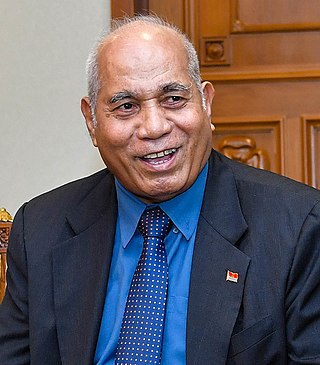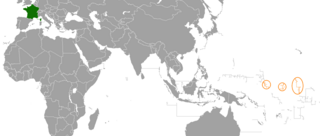Related Research Articles

Kiribati, officially the Republic of Kiribati, is an island country in the Micronesia subregion of Oceania in the central Pacific Ocean. Its permanent population is over 119,000 as of the 2020 census, with more than half living on Tarawa atoll. The state comprises 32 atolls and one remote raised coral island, Banaba. Its total land area is 811 km2 (313 sq mi) dispersed over 3,441,810 km2 (1,328,890 sq mi) of ocean.

Politics of Kiribati takes place in a framework of a parliamentary representative democratic republic, whereby the Beretitenti, President of Kiribati, is both the head of state and head of government, and of a multi-party system. Executive power is exercised by the government, Beretitenti, and his cabinet, all MPs. Legislative power is exercised by the House of Assembly. The Judiciary of Kiribati is independent of the executive and the legislature. The Constitution of Kiribati, promulgated at independence on 12 July 1979, establishes the Republic of Kiribati as a sovereign democratic republic and guarantees the fundamental rights of its citizens and residents.

The Line Islands, Teraina Islands or Equatorial Islands are a chain of 11 atolls and coral islands in the central Pacific Ocean, south of the Hawaiian Islands. Eight of the atolls are parts of Kiribati. The remaining three—Jarvis Island, Kingman Reef, and Palmyra Atoll—are territories of the United States grouped with the United States Minor Outlying Islands. The Line Islands, all of which were formed by volcanic activity, are one of the longest island chains in the world, stretching 2,350 km (1,460 mi) from northwest to southeast. One of them, Starbuck Island, is near the geographic center of the Pacific Ocean. Another, Kiritimati, has the largest land area of any atoll in the world. Only Kiritimati, Tabuaeran, and Teraina have a permanent population. Besides the 11 confirmed atolls and islands, Filippo Reef is shown on some maps, but its existence is doubted.

The Gilbert Islands are a chain of sixteen atolls and coral islands in the Pacific Ocean, about halfway between Papua New Guinea and Hawaii. They constitute the main part of the country of Kiribati.

Anote Tong is an I-Kiribati environmental activist and former politician for the Pillars of Truth party with half Chinese heritage, who served as the fourth president of Kiribati, from 2003 to 2016. He won the election in July 2003 with a slim plurality of votes cast (47.4%) against his older brother, Harry Tong (43.5%) and the private lawyer Banuera Berina (9.1%). The elections were contested by the opposition, due to allegations of electoral fraud but the High Court of Tarawa had confirmed that there was no fraud. He was re-elected on 17 October 2007 for a second term (64%). In 2012, Tong was reelected for a third term, although with a significantly smaller percentage than in the previous two elections.

Ieremia Tienang Tabai is an I-Kiribati politician who served as the first president of Kiribati from 1979 to 1991. He previously served in the equivalent role, chief minister, under the colonial government from 1978 to 1979. Tabai returned to the House of Assembly in 1998 and represented Nonouti as of his re-election in 2024.

Caroline Island is the easternmost of several uninhabited coral atolls comprising the southern Line Islands in the central Pacific Ocean nation of Kiribati.

Teatao Teannaki was an I-Kiribati political figure who served as the second president of Kiribati from 1991 until 1994.

Teburoro Tito is an I-Kiribati politician and diplomat who served as the third president of Kiribati from 1994 to 2003.

France and Kiribati maintain official diplomatic relations, but no diplomatic presence on each other's territory; the French embassy in Suva is accredited to Kiribati.

Presidential elections were held in Kiribati on 17 February 1983. Four candidates were chosen from members of parliament: incumbent president Ieremia Tabai, vice-president Teatao Teannaki, who was an ally of Tabai, opposition member Tewareka Tentoa, and newly elected opposition member Harry Tong. Tabai was re-elected with 49.61% of the vote.

Presidential elections were held in Kiribati on 3 July 1991. Vice-President Teatao Teannaki of the National Progressive Party (NPP) was elected with 46% of the vote, defeating his main opponent Roniti Teiwaki of Te Waaki ae Boou, who received 42% of the vote.

Presidential elections were held in Kiribati on 30 September 1994. The result was a victory for Teburoro Tito, who received 51% of the vote. The elections were held following a motion of no confidence that dissolved the government of incumbent president Teatao Teannaki while an investigation was opened in the possible misuse of travel expense claims by its ministers. Members of the government brought multiple defamation lawsuits against the opposition in response to the claims of misconduct, some of which were not resolved until years after the elections.

Taomati T. Iuta was an I-Kiribati politician. He was Speaker of the House of Assembly of Kiribati for the Ninth Parliament (2011–2015). He was the vice president of Kiribati from 1991 to 1994.

Women in Kiribati are women who live in or are from the atoll nation of Kiribati. The role of Kiribati women is described in the publication Kiribati, A Situation Analysis of Children, Women and Youth (2005) as "largely defined by her age and marital status". Prestige is inherent to the married Kiribati woman, but she is considerably under the authority of her husband.

Taneti Maamau is an I-Kiribati politician who has served as the fifth president of Kiribati since 2016. A member of the Tobwaan Kiribati Party, his policies are targeted at strengthening Kiribati's weak economy and alleviating social issues. His government announced the Kiribati Vision for 20 Years (KV20), which plans to develop the tourism and fishing industries with aid from foreign investors.
Tekiree Tamuera is an I-Kiribati political figure.

Roniti Teiwaki is an I-Kiribati politician.

Kiribati-Taiwan relations refers to relations between Kiribati and Taiwan. Kiribati, under the government of President Taneti Mamau, initially recognised the ROC but switched to PRC later on.
References
- ↑ Van Trease, Howard (1995). Atoll Politics: The Republic of Kiribati. University of Hawai'i Press. p. 20. ISBN 9780958330008.
- ↑ World Statesmen Kiribati